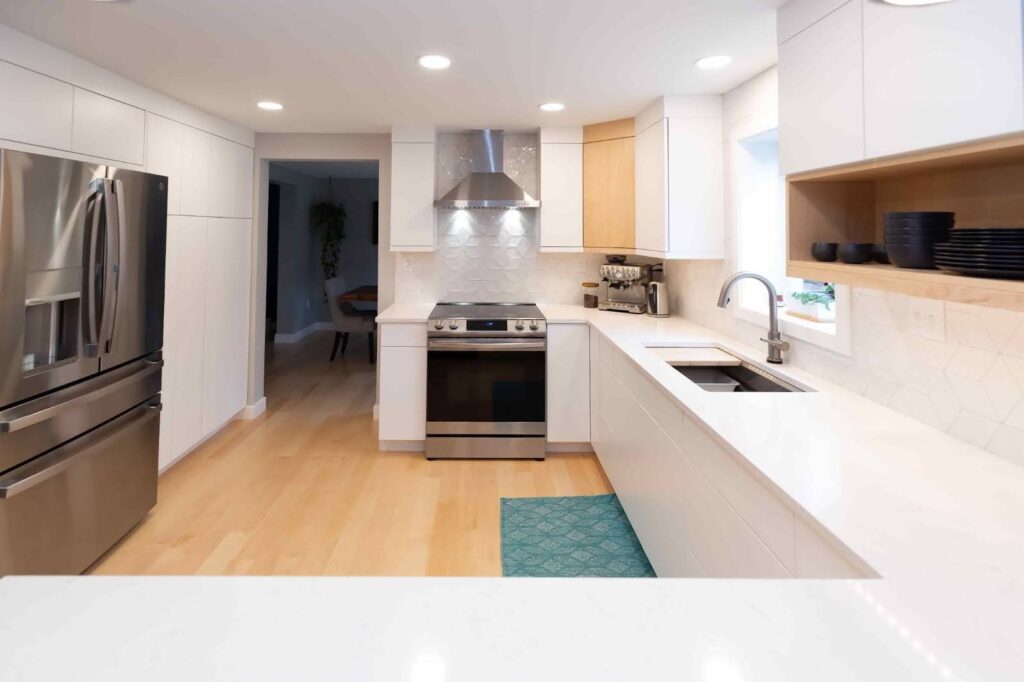You’re not just choosing a countertop—you’re deciding what your kitchen will feel like for the next 10, 15, maybe 20 years.
That’s a big decision. And with so many countertop materials out there—quartz, granite, butcher block, laminate—the right choice depends on more than looks. It depends on how you cook, clean, live, and want your space to work.
In this guide, we’ll break down the most popular kitchen countertop options—what they cost, how they hold up, and who they’re really for. At Distinctive Surfaces, we’ve helped thousands of homeowners across the Capital Region find surfaces that match their style and stand up to real life.
The Role of Function: How You Use Your Kitchen Should Drive the Choice
Your kitchen habits should shape your countertop, not the other way around.
If you cook every night, host family brunches, or prep a week’s worth of meals in one go, you need something that can keep up. That means scratch resistance, stain protection, and a surface that doesn’t flinch at heat or spills. But if you’re more of a reheat-and-go type, you might have room to prioritize look over longevity.
Got messy toddlers with jelly hands and juice boxes? Go for something easy to clean. Have friends over for wine and cheese every weekend? Think about stain resistance. Planning on chopping directly on the counter or setting down hot pans? You’ll need a material that can take the heat—and still look good doing it.
This isn’t just about taste. It’s about your daily rhythm and how your kitchen fits into it.
Up next, we’ll walk through the most popular kitchen countertop materials—from granite and quartz to marble, butcher block, and beyond. And we’ll call out exactly who each one works best for.
Because the right countertop isn’t just beautiful, it’s built for your life.
1. Granite Countertops: Classic Durability with Natural Beauty
There’s a reason granite countertops have been the go-to for decades—and it’s not just tradition. This natural stone earns its spot through real performance: it resists scratches, stands up to high temperatures, and brings a unique, raw beauty you simply won’t find in factory-mixed materials. No two granite slabs are the same, which means your kitchen countertop tells a story all its own.
It’s an ideal fit for busy kitchens that double as homework stations, coffee bars, or baking zones. But here’s the tradeoff—granite needs resealing. Without it, liquids can seep in. That said, if you’re willing to give it a little attention once a year, it’ll give back decades of use and wow-factor.
It also lays the foundation (literally) for how you experience your space. That durability we mentioned earlier? This is where it starts to show up. And for those who want a blend of function and elegance, granite remains a staple choice for good reason.
2. Quartz Countertops: Low-Maintenance Meets Modern Appeal
If granite is the rugged artist, quartz is the sleek architect. Made from ground quartz and resin, this countertop material is engineered to be non-porous, highly resistant to stains, and—best of all—no sealing required.
That means less maintenance, fewer worries, and more freedom to just live in your kitchen. For families, professionals, or anyone who doesn’t want to think twice about red wine spills or curry night, quartz countertops are a lifesaver.
Compared to granite, you get a more uniform look—great for modern kitchens that favor clean lines and coordinated colors. But you do lose some of that natural unpredictability. If you’re after variation and organic movement, you may miss what natural stone countertops like granite or marble provide.
Still, for homeowners looking for peace of mind and performance in high-use spaces, quartz is low-maintenance, dependable, and sharp-looking.
3. Marble Countertops: Elegant, Timeless, and a Bit High-Maintenance
Marble is what happens when form seduces function. It’s undeniably beautiful—soft veining, natural movement, and a warmth that’s hard to replicate. But as we mentioned earlier, how you use your kitchen should guide what material you choose. And marble? It’s not for the rough-and-tumble.
It’s softer and more porous than granite or quartz, which means it’s prone to etching, staining, and even scratching if you’re not careful. That said, if you’re not slicing lemons or pouring wine directly on it every day, it can still be a practical choice—especially for statement islands, baking stations, or lower-traffic homes.
And here’s the deeper truth: sometimes, the patina is the charm. If you’re the kind of person who sees beauty in a little wear—who loves the idea of a countertop that ages like leather—then marble might not be a compromise. It might be exactly right.
Coming up, we’ll explore other countertop options like butcher block and solid surface, and how they compare in function, style, and budget.
Beyond the Basics: Other Countertop Materials
Most kitchens don’t need to venture far beyond the staples—and for good reason. While materials like butcher block, solid surface (like Corian), laminate, or even soapstone and concrete have their niche appeal, each comes with trade-offs in durability, upkeep, or longevity.
They scratch, stain, or weather faster, and often need more maintenance than most homeowners expect. By contrast, granite, quartz, and marble continue to lead the way for their staying power, style range, and ability to hold up under real, daily use. These aren’t just countertops—they’re investments that perform.
Final Verdict: How to Choose the Right Kitchen Countertop With Confidence
There’s no single “best” kitchen countertop—only the one that fits your space, your habits, and your future. Maybe it’s the low-maintenance ease of quartz, the natural character of granite, or the soft elegance of marble. What matters most is choosing a surface that works the way you do. For homeowners who want performance and beauty that lasts, natural stone countertops are still the gold standard.
See the materials. Ask smart questions. Picture your kitchen ten years from now. Because your countertop isn’t just décor—it’s where mornings begin, guests gather, and real life happens.
Ready to talk countertops? Distinctive Surfaces is here to help you find the right fit—beautifully, practically, and confidently. Send us a message today.
Frequently Asked Questions
What’s the best kitchen countertop material for a remodel on a budget?
If you’re remodeling on a tighter budget, laminate countertops or solid surface countertops like Corian can offer an affordable countertop option. They come in a wide range of colors and styles, though they’re less durable than granite, marble, and quartz countertops. If long-term value matters, it’s still worth exploring entry-level quartz countertops that offer durability with minimal upkeep.
Do countertop materials vary a lot in maintenance and durability?
Yes, countertop materials vary significantly. Quartz is a nearly non-porous surface that resists stains and needs no sealing, while marble and granite offer natural beauty but require regular upkeep. Materials like wood countertops and butcher block countertops need oiling, while concrete countertops can crack or stain without proper sealing. Choosing the right one depends on how you use your kitchen.
What should I expect to pay per square foot for new countertops?
Prices per square foot depend on the type of countertop you choose. Laminate countertops are usually among the cheapest per square foot installed, while quartz, marble, and granite typically on the higher end, depending on the slab, edge, and installation needs. Marble countertops and exotic stone types may cost more, especially with custom cuts or premium finishes. Always compare pricing across several countertop options to find the perfect balance of cost and longevity.

